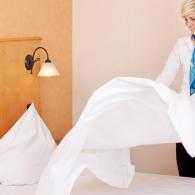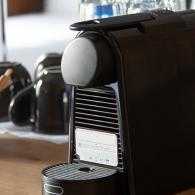Hotels are facing fierce competition. According to CityLab, U.S. consumers spent more on Airbnb in 2018 than they did on Hilton and its subsidiaries – the second-largest hotel chain in the world. With the meteoric rise of Airbnb and its low-priced lodging options, it has become vital for traditional hotels to emphasize outstanding upkeep and stay clean around the clock.
Most hotels have the advantages of full-time cleaning staff and industrial-strength products to remain consistently clean. Even so, variables such as high foot traffic and unpredictable weather make it challenging for hotels to look, feel and smell their best for every guest that walks through the door.
By focusing on three core facets of the visitor experience, hotels can achieve reliable cleaning results and keep travelers flowing to the front desk for check-in.
Systemic Spotlessness
In today’s digital age, online reviews criticizing a hotel’s lack of cleanliness can mean trouble for not just a single property, but an entire brand. The solution is a team-oriented approach to defining and executing the brand’s cleanliness standard. For hotels – especially nationwide or international chains – maintaining a brand standard of constant cleanliness is essential for earning repeat business.
The standard of cleanliness should emphasize the areas that affect customers’ buying behavior the most. These include guest rooms, common areas, restrooms, entrance ways, hallways/floors and other customer-facing areas. Taking the following steps helps create a brand standard.
- Define the brand cleanliness standards. Hotel staff, cleaning partners and chemical manufacturers should all have a say here. Together, they should figure out exactly what the hotel wants the customer to experience during each visit.
- Devise a thorough and strategic cleaning plan. Carefully select the right products, processes, tools and equipment. For instance, super-concentrated chemicals and dilution-control dispensers support productivity, sustainability and the bottom line.
- Implement Training. Especially for large organizations, online training programs are the ideal option. They are available 24/7 in multiple languages and allow for scheduling flexibility that is necessary across a hotel brand’s locations.
- Monitor performance. This is another opportunity to use the technology to get a leg up. There are secure online auditing platforms that collect, analyze and report data in real time, allowing businesses to spot trends and issues and adjust accordingly.
Laundered, Stainless Linens
After a full day in airports, or on the road, it can be discouraging for a hotel guest to walk into a room only to see the comforter or towels covered in stains. Bedspreads and other linens can be kept stain-free with the following steps.
- Use the best products and follow best practices. Hotels should always stock and apply effective detergents and respect the recommended pre- and main-wash temperatures, doses of detergent, bleaches and pH control.
- Apply pre-spotters for stubborn stains. These work best for the removal of outdoor soils like sunscreen and grass stains.
- Streamline the laundry operation. Smart laundry solutions give managers remote monitoring capabilities that ensure up-to-date information anytime, anywhere.
Kitchen Hygiene is Key
Contaminants can sneak into guests’ food or drinks if employees don’t follow hygiene protocols. Along with selecting quality cleaning products, here are a few ways to avoid the dreaded “leftover-food-on-my-utensils” problem and similar complaints.
- Stick to a regular schedule for cleaning food contact surfaces. Cross-contamination is all too common in hotel restaurants. Implementing an easy-to-follow process that details sanitization responsibilities makes it instinctive for kitchen staff to know what to clean and when to clean it.
- Train, train, train. Foodborne illnesses are often the result of employees failing to follow the proper procedures. Every employee must understand how to properly handle food, clean and sanitize surfaces and exercise regular handwashing. A flexible online program that tests employees and tracks their progress is the best choice.
- Utilize intelligent dishwashing solutions. Today, there are smart dishwashing platforms that allow managers to closely oversee the cleanliness of dishes, utensils and glassware to reduce the risk of contamination. These platforms offer real-time, actionable insights.
The Bottom Line
Taken together, the above three ideas represent a potential competitive advantage for hotels against upstart competitors like Airbnb. The hotels that stick to these foundational processes, while integrating leading-edge technology wherever possible, are more likely to survive the disruption shaking up today’s lodging industry.
For more information about hospitality solutions for your business, visit diversey.com/industry-sectors/hospitality or reach out to a Diversey representative at https://diversey.com/en/contact-us.






